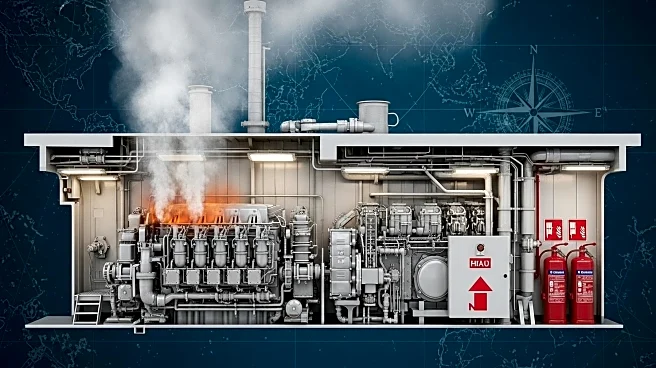What's Happening?
The UK's Marine Accident Investigation Branch (MAIB) has released a report detailing the causes and response to a fire aboard the RoRo cargo ship Finnmaster in 2021. The fire occurred shortly after the vessel departed from the Port of Hull, England, and was attributed to a series of mechanical failures and improper modifications. The report highlights that a malfunction in one of the auxiliary engines led to hot exhaust gases impinging on a flexible hose, which subsequently failed and leaked fuel onto a hot component, igniting the fire. The investigation found that the hose was installed during a modification that did not meet required standards and lacked oversight from the class society, RINA. The crew's response was hampered by the failure of critical safety systems, including the emergency generator and CO2 fire-extinguishing system. Despite these challenges, the crew managed to extinguish the fire with the help of tugs and dry powder extinguishers.
Why It's Important?
This incident underscores the critical importance of adhering to safety standards and proper oversight in maritime operations. The MAIB's findings highlight vulnerabilities in the ship's safety systems and the need for rigorous maintenance and training protocols. The report's recommendations aim to enhance safety measures, including improved testing of emergency systems and updated training for crew members. The incident serves as a cautionary tale for the shipping industry, emphasizing the potential consequences of inadequate safety practices and the need for continuous improvement in emergency response procedures. The recommendations could lead to changes in international maritime safety regulations, impacting ship operators, classification societies, and regulatory bodies.
What's Next?
The MAIB has issued 12 recommendations to various stakeholders, including the Finnish administration, Finnlines, and RINA. These recommendations call for amendments to International Maritime Organization (IMO) guidelines, improved training and response procedures, and a review of maintenance protocols for fire protection systems. The implementation of these recommendations could lead to enhanced safety standards across the maritime industry. Stakeholders are expected to review and potentially adopt these recommendations to prevent similar incidents in the future. The shipping company and classification society may also need to reassess their current practices and make necessary adjustments to comply with the new guidelines.
Beyond the Headlines
The incident raises broader questions about the adequacy of current maritime safety regulations and the role of classification societies in ensuring compliance. It highlights the need for a more proactive approach to safety management, including regular audits and inspections of safety systems. The case also illustrates the challenges faced by crew members in emergency situations and the importance of effective communication and coordination during such events. The findings could prompt a reevaluation of training programs to better prepare crews for handling emergencies, ultimately leading to a safer maritime environment.










